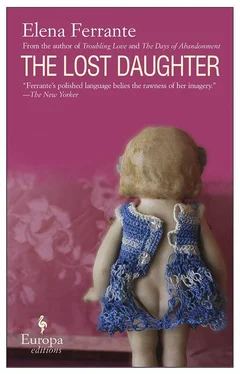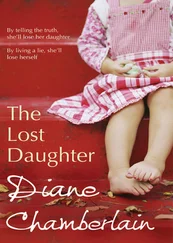Elena Ferrante
The Lost Daughter
I had been driving for less than an hour when I began to feel ill. The burning in my side came back, but at first I decided not to give it any importance. I became worried only when I realized that I no longer had the strength to hold onto the steering wheel. In the space of a few minutes my head became heavy, the headlights grew dimmer; soon I even forgot that I was driving. I had the impression, rather, of being at the sea, in the middle of the day. The beach was empty, the water calm, but on a pole a few meters from shore a red flag was waving. When I was a child, my mother had frightened me, saying, Leda, you must never go swimming if you see a red flag: it means the sea is rough and you might drown. That fear had endured through the years, and even now, although the water was a sheet of translucent paper stretching to the horizon, I didn’t dare go in: I was anxious. I said to myself, go on, swim: they must have forgotten the flag, and meanwhile I stayed on the shore, cautiously testing the water with the tip of my toe. Only at intervals my mother appeared at the top of the dunes and shouted to me as if I were still a child: Leda, what are you doing, don’t you see the red flag?
In the hospital, when I opened my eyes, I saw myself again hesitating for a fraction of a second before the flat sea. Maybe that was why, later, I convinced myself that it wasn’t a dream but a fantasy of alarm that lasted until I woke up in the hospital room. The doctors told me that my car had ended up against the guardrail but without critical consequences. The only serious injury was in my left side, an inexplicable lesion.
My friends from Florence came, Bianca and Marta returned, and even Gianni. I said it was drowsiness that had sent me off the road. But I knew very well that drowsiness wasn’t to blame. At the origin was a gesture of mine that made no sense, and which, precisely because it was senseless, I immediately decided not to speak of to anyone. The hardest things to talk about are the ones we ourselves can’t understand.
When my daughters moved to Toronto, where their father had lived and worked for years, I was embarrassed and amazed to discover that I wasn’t upset; rather, I felt light, as if only then had I definitively brought them into the world. For the first time in almost twenty-five years I was not aware of the anxiety of having to take care of them. The house was neat, as if no one lived there, I no longer had the constant bother of shopping and doing the laundry, the woman who for years had helped with the household chores found a better-paying job and I felt no need to replace her.
My only obligation with regard to the girls was to call once a day to see how they were, what they were doing. On the phone they spoke as if they were on their own; in reality they lived with their father, but, accustomed to keeping us separate even in words, they spoke to me as if he didn’t exist. To my questions on the state of their lives they answered either in a cheerfully evasive manner, or with an ill humor full of irritable pauses, or in the artificial tones they assumed when they were in the company of friends. They called me often, too, especially Bianca, who had a more imperiously demanding relationship with me, but only to know if blue shoes would go with an orange skirt, if I could find some papers left in a book and send them urgently, if I was still available to be blamed for their rages, their sorrows, in spite of the different continents and the spacious sky that separated us. The telephone calls were almost always hurried, sometimes they seemed fake, as in a movie.
I did what they asked, reacted in accordance with their expectations. But since distance imposed the physical impossibility of intervening directly in their lives, satisfying their desires or whims became a mixture of rarefied or irresponsible gestures, every request seemed light, every task that had to do with them an affectionate habit. I felt miraculously unfettered, as if a difficult job, finally brought to completion, no longer weighed me down.
I began to work without regard for their schedules and their needs. I corrected my students’ papers at night, listening to music; I slept a lot in the afternoon, with earplugs; I ate once a day and always at a trattoria next door. I changed rapidly—my habits, my mood, my very physical appearance. At the university I was no longer irritated by the students who were too stupid and those who were too smart. A colleague I had known for years and whom occasionally, rarely, I slept with, said to me in bewilderment one evening that I had become less distracted, more generous. In a few months I regained the slender body of my youth and felt a sensation of gentle strength; it seemed to me that my thoughts had returned to their proper speed. One night I looked at myself in the mirror. I was forty-seven years old, I would be forty-eight in four months, but by some magic years had fallen from me. I don’t know if I was pleased; certainly I was surprised.
It was in this state of unusual well-being that, when June came, I felt like taking a vacation, and I decided that I would go to the sea as soon as I had finished with exams and the annoying bureaucratic formalities. I looked on the Internet, studied photographs and prices. Finally I rented a small, fairly inexpensive apartment on the Ionian coast, from mid-July to the end of August. In fact, I didn’t manage to leave until July 24th. The drive was easy, the car packed mainly with books that I needed for preparing next year’s courses. The day was beautiful; through the open windows came a breeze full of parched summer scents, and I felt free and without guilt at my freedom.
But halfway there, as I was getting gas, I felt suddenly anxious. In the past I had loved the sea, but for at least fifteen years being in the sun had made me nervous, exhausted me instantly. The apartment would surely be ugly, the view a distant slice of blue amid cheap, squalid houses. I wouldn’t sleep a wink because of the heat and some night club playing music at high volume. I made the rest of the journey with a faint ill humor and the sense that I would have been able to work at home comfortably all summer, breathing the air-conditioned air in the silence of my apartment.
When I arrived the sun was setting. The town seemed pretty, the voices had a pleasing cadence, there were good smells. Waiting for me was an old man with thick white hair who was respectfully cordial. First he bought me a coffee at the bar, and then, with a mixture of smiles and unmistakable gestures, he prevented me from carrying even a single bag into the house. Loaded down with my suitcases, he climbed, panting, to the fourth and top floor, and put them down in the doorway of a small penthouse: bedroom, tiny windowless kitchen that opened directly into the bathroom, a living room with big picture windows, and a terrace from which one could see, in the twilight, a rocky, jagged coast and an infinite sea.
The man’s name was Giovanni; he wasn’t the owner of the apartment but a sort of caretaker or handyman; yet he wouldn’t accept a tip, in fact, he was almost offended, as if I hadn’t understood that he was merely following the rules of a proper welcome. When, having been assured many times that everything was to my satisfaction, he left, I found on the table in the living room a big tray of peaches, plums, pears, grapes, and figs. The tray shone as if in a still-life.
I carried a wicker chair out to the terrace, and sat for a while to watch the evening descend on the sea. For years every vacation had revolved around the two children, and when they got older and began traveling the world with their friends I always stayed home, waiting for their return. I worried not only about all kinds of catastrophes (the dangers of air travel, ocean voyages, wars, earthquakes, tidal waves) but about their fragile nervous systems, possible tensions with their traveling companions, sentimental dramas because of affections returned too easily or not returned at all. I wanted to be ready to cope with sudden requests for help, I was afraid they would accuse me of being what in fact I was, distracted or absent, absorbed in myself. Enough. I got up, went to take a shower.
Читать дальше












